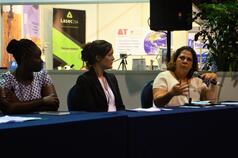The GFIA panel session, organised by GODAN (with GFAR and CTA), explored open data for agricultural innovation by linking different actors of the open data value chain together. The session was facilitated by Valeria Pesce of GFAR.
The Global Forum for Rural Advisory Services (GFRAS) is recruiting an executive secretary to lead and further expand its activities, starting from mid-2016. This position will be based at the GFRAS Secretariat in Lindau or Lausanne, Switzerland. The executive secretary’s term is for a four year mandate, renewable only once based on an assessment and decision of the GFRAS steering committee.
This booklet presents the key messages of FAO on climate change and food security. It includes a synthesis of the most recent support provided by FAO to countries to face the impacts of climate change. It also brings together the most relevant knowledge on climate change including tools and methodologies FAO can offer to countries to report on their greenhouse gas emissions coming from the agriculture, livestock and forestry sectors.
Agropolis Fondation, Fondazione Cariplo and Fondation Daniel et Nina Carasso have just launched a call for proposals for the “Thought for Food Initiative: Transdisciplinary research towards more sustainable food systems”
The Nutrition Division of FAO (ESN), in partnership with the Statistics Division (ESS) and the Food Safety and Quality Unit (AGDF) of FAO, the World Health Organization (WHO) and other international partners, is building a pilot Global Individual Food consumption data Tool (FAO/WHO GIFT) (http://www.fao.org/food/evaluationnutritionnelle/foodconsumptiondatabase/en/).
The Land Portal technology/ Open Data Developer will be a multi-skilled professional part of the Land Portal coordination Unit.
Agriculture represents an important segment of the economies of Africa, Latina America and the Caribbean (LAC), and Brazil and its importance to development have been extensively recognized and emphasized. Over the past 30 years, Brazilian agricultural growth and development has been guided by policies and technologies based on research for development. Brazilian policies, experience, and focus in social programs such as Fome Zero (Zero Hunger) targeting social protection networks for the poor, provide an important linkage between the regions.

